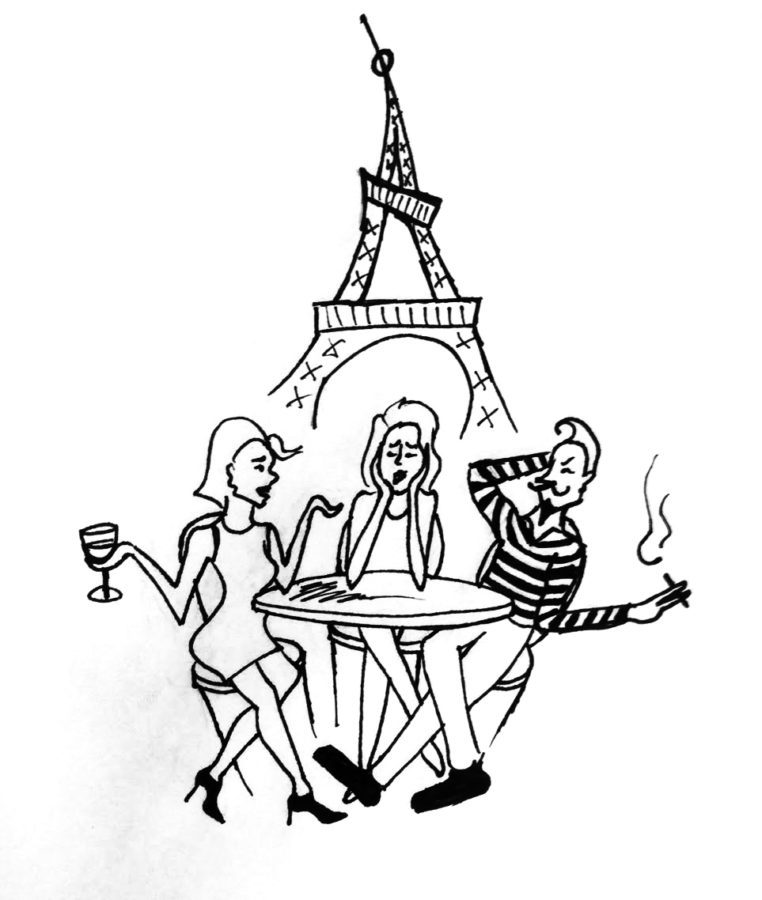After standing in line for 20 minutes only to find out that the Starbucks on Paris’ famous Champs-Élysées had finished brewing decaf coffee for the night, I resigned to order anyway, struggling to communicate that I just wanted a normal coffee. No, not an Americano or a Cappuccino or a café allongé (which is just espresso with added water). After a back-and-forth verbal tug of war resulting from both linguistic and cultural barriers—because the French don’t understand regular drip coffee—I cupped my hand for my change, and the barista, leaning over the counter, whispered in his broken English, “I’m so tired, and my boss is a dick.”
Good for you, barista boy. Learning foreign street slang is one thing, but correctly using it scores major bonus points among natives. After I learned how the French say “tipsy,” I’d asked everyone if their post-dinner pinot noir had them feeling a little pompette.
This wasn’t the first time I made the most of my study abroad experience by picking up the more unteachable things. My Friday nights spent along the banks of the Seine with French friends studying at the Sorbonne have taught me the more useful (if less appropriate) vocabulary I need. Because the only word I knew for “to kiss” is used in the context of kissing your grandmother on the cheek after Thanksgiving dinner, I have said, “OK, just tell me how you say ‘to make out.’”
Studying abroad creates, without a doubt, a heavily filtered reality. Essentially, it is an extended vacation. But I wouldn’t call myself disillusioned by the Parisian charm—I have become hypersensitive to my surroundings. The cultural differences between America and France have helped me recognize how arrogance, in general, is relative to one’s own culture. In the United States, we are proud to be cigarette-free. But in Paris, where it’s custom to see ashtrays on Starbucks tables, your smoke-free attitude would have Parisians blowing smoke in your face. Walk along the Seine any Friday or Saturday night, and you’ll find groups of French teens and 20-somethings, sipping wine and smoking Camels. For Americans, cigarettes equate to cancer. For the French, they’re casual. Don’t take this as a go-ahead to pick up smoking as your newest habit. All I know is that being dropped in a culture with different values and expectations can ultimately make us turn from viewing something as completely appalling to quite appealing.
During my first few weeks here, constantly speaking and simply thinking in French exhausted me. On the first day, when I grabbed groceries, it took me four times to understand the cashier when she told me that I had to weigh my fruit before bringing it to the register, and because the words “to dress” (s’habiller) and “to live” (habiter) sound somewhat similar, I accidentally told a French friend that I had to go live in my clothes. When I went to the doctor because my eyes felt strained, I approached a waiting room full of patients and stuttered, in French, “I’m not French, and I’ve never been here. So what do I do?” and an elderly woman sitting closest to me laughed and motioned for me to sit next to her: “You sit down and you wait.”
In my opinion, one of the primary goals of studying in a foreign country is to push students really far out of their comfort zones. And it’s true that when I walk alone in the Marais or near Notre Dame, I deal with sudden spurts of melancholy. Call it what you will—homesickness, culture shock, perhaps a little nostalgia—but sometimes I miss Sunday night football and raking fall leaves and Hershey brand chocolate. But as I persevered through the discomfort, I’ve been able to level-up from a timid tourist to a quasi-local helping lost Frenchies get to the right metro stop.
I want to be French just as much as the next Francophile and just as much as the Parisian girls enchanted by Rihanna and T-Swift want to be American, but I’m not French, whatever that means. The cultural mélange that sweeps through Paris makes identifying the disparity of cultural expectations quite tricky: French McDonald’s sell every macaron flavor imaginable, and chain stores advertise their “MEGA-SALES!!!” promotions in English. Once, in the cramped cars of the Parisian subway trains, I sat awkwardly among a group of sweaty French teenage boys, one wearing a snapback and another with his skateboard propped next to him. OK, so are these like French…bros? I eavesdropped on their weekend adventures around Paris, and as the two across from me stood up to leave, they both kissed their skateboarding friend on each cheek and yelled, “Bisous!”—“Kisses!”—before leaving.
Explaining the basics of fraternities, sororities, my senior prom, and homecoming football games spurred another realization that so much of what is important to me, and to my friends, and to my culture, is nearly incomprehensible to others. A lot of what I’ve come to value is of no importance to a lot of French students, which has at times created an intense feeling of isolation while abroad.
The work of study abroad seems to be bridging that gap, finding the similarities, noticing the differences, and somehow letting the isolation dissolve. I keep expecting things here to be the same as they are in America. They are and they aren’t at the same time. The navigation can be bumpy at times, but I’m coming to find a home in Paris, one that is different and the same all at once.
Brooke White is a second-year in the College majoring in political science.








